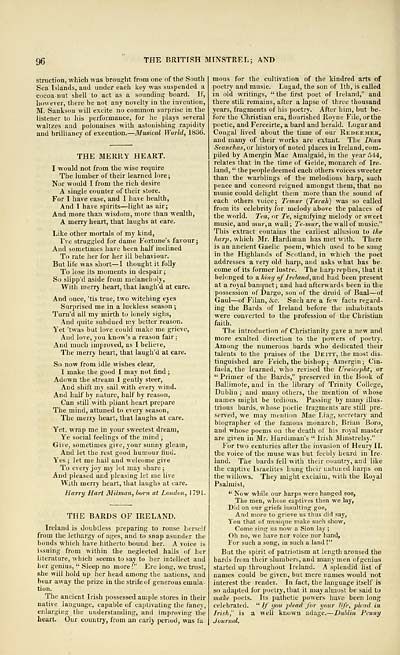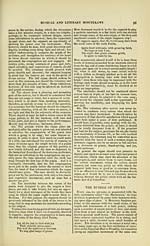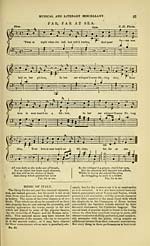Glen Collection of printed music > Printed music > British minstrel, and musical and literary miscellany
(434) Page 96
Download files
Complete book:
Individual page:
Thumbnail gallery: Grid view | List view

96
THE BRITISH MINSTREL: AND
struction, which was brought from one of the South
Sea Islands, aud under each key was suspended a
cocoa-nut shell to act as a sounding board. If,
however, there he not any novelty in the invention,
M. Sankson will excite no common surprise in the
listener to his performance, for he plays several
■waltzes and polonaises with astonishing rapidity
and brilliancy of execution. — Maeical World, 1836.
THE MERRY HEART.
I would not from the wise require
The lumber of their learned lore;
Nor would I from the rich desire
A single counter of their store.
For I have ease, and I have health,
And I have spirits — light as air;
And more than wisdom, more than wealth,
A merry heart, that laughs at care.
Like other mortals of my kind,
I've struggled for dame Fortune's favour;
And sometimes have been half inclined
To rate her for her ill behaviour.
But life was short — I thought it folly
To lose its moments in despair ;
So slipp'd aside from melancholy,
With merry heart, that laugh'd at care.
And once, 'tis true, two witching eyes
Surprised me in a luckless season ;
Turn'd all my mirth to lonely sighs.
And quite subdued my better reason.
Yet 'twas but love could make me grieve,
And love, you know's a reason fair:
And much improved, as I believe,
The merry heart, that laugh'd at care.
So now from idle wishes clear,
I make the good I may not find ;
Adown the stream I gently steer,
And shift my sail with every wind.
And half by nature, half by reason.
Can still with pliant heart prepare
The mind, attuned to every season,
The merry heart, that laughs at care.
Yet, wrap me in your sweetest dream.
Ye social feelings of the mind ;
Give, sometimes give, your sunny gleam,
And let the rest good humour hud.
Yes ; let me hail and welcome give
To every joy my lot may share ;
And pleased and pleasing let me live
With merry heart, that laughs at care.
Harry Hart Milman, birrn at Loudon, 1791.
THE BARDS OF IRELAND.
Ireland is doubtless preparing to rouse herself
from the lethargy of ages, and to snap asunder the
bonds which have hitherto bound her. A voice is
issuing from within the neglected halls of her
literature, which seems to say to her intellect and
her genius, " Sleep no more !" Ere long, we ti-ust,
she will hold up her head among the nations, and
bear away the prize in the strife of generous emula-
tion.
The ancient Irish possessed ample stores in their
native language, capable of captivating the fancy,
enlarging the understanding, and improving the
heart. Our country, from an early period, was fa-
mous for the cultivation of the kindred arts of
poetry and music. Lugad, the son of Ith, is called
in old writings, " the first poet of Ireland," and
there stili remains, after a lapse of three thousand
years, fragments of his poetry. After him, but be-
fore the Christian era, flourished Royne File, or the
poetic, and Ferceirte, a bard and herald. Lugarand
Congal lived about the time of our Redeemer,
and many of their works are extant. The DUm
Seanchas, or history of noted places in Ireland, com.
piled by Amergin Mac Amalgaid, in the year 544,
relates that in the time of Geide, monarch of Ire-
land, " the people deemed each others voices sweeter
than the warblings of the melodious harp, such
peace and concord reigned amongst them, that no
music could delight them more than the sound of
each others voice; Tmmr (Tarah) was so called
from its celebrity for melody above the palaces of
the world. Tea, or Te, signifying melody or sweet
music, and mur, a wall ; Te-mur, the wall of music."
This extract contains the earliest allusion to the
harp, which Mr. Hardiman has met with. There
is an ancient Gaelic poem, which used to be sung
in the Highlands of Scotland, in which the poet
addresses a very old harp, and asks what has be-
come of its former lustre. The harp replies, that it
belonged to aJdng of Ireland, anA had been present
at a royal banquet ; and had afterw ards been in the
possession of Dargo, son of the druid of Baal — of
Gaul — of Filan, &.c. Such are a few facts regard-
ing tlie Bards of Ireland before the inhabitants
were converted to the profession of the Christian
faith.
The introduction of Christianity gave a new and
more exalted direction to the powers of poetry.
Among the numerous bards who dedicated their
talents to the praises of the Deity, the most dis-
tinguished are Feich, the bishop ; Amergin ; Cin-
faela, the learned, who revised the Uraicepht, or
" Primer of the Bards," preserved in the Book of
Ballimote, and in the library of Trinity College,
Dubhn; and many others, the mention of whose
names might be tedious. Passing by many illus-
trious bards, whose poetic fragments are still pre-
served, we may mention Mac Liag, secretary and
biographer of the famous monarch, Brian Boro,
and whose poems on the death of his royal master
are given in Mr. Hardiman's " Irish Minstrelsy."
For two centuries after the invasion of Henry IT.
the voice of the muse was but feebly heard in Ire-
land. The bards fell with their country, and like
the captive Israelites hung their untuned harps on
the willows. They might exclaim, with the Royal
Psalmist,
" Now wliile our harps were hatiped soe,
,The men, whose captives then we lay.
Did on our griefs insulting goe.
And more to grieve us thus did say.
You that of musique make such show.
Come sing us now a Sion lay ;
Oh no, we have nor voice nor hand.
For such a song, in such a land 1"
But the spirit of patriotism at length aroused the
bards from their slumbers, and many men of genius
started up throughout Ireland. A splendid list of
names could be given, but mere names would not
interest the reader. In fact, the language itself is
so adapted for poetry, that it may almost be said to
mahe poets. Its pathetic powers have been long
celebrated, *' If you jdead for your life, jileod in
Irish," is a well known adage. — Dubim Penny
Jimrnci^
THE BRITISH MINSTREL: AND
struction, which was brought from one of the South
Sea Islands, aud under each key was suspended a
cocoa-nut shell to act as a sounding board. If,
however, there he not any novelty in the invention,
M. Sankson will excite no common surprise in the
listener to his performance, for he plays several
■waltzes and polonaises with astonishing rapidity
and brilliancy of execution. — Maeical World, 1836.
THE MERRY HEART.
I would not from the wise require
The lumber of their learned lore;
Nor would I from the rich desire
A single counter of their store.
For I have ease, and I have health,
And I have spirits — light as air;
And more than wisdom, more than wealth,
A merry heart, that laughs at care.
Like other mortals of my kind,
I've struggled for dame Fortune's favour;
And sometimes have been half inclined
To rate her for her ill behaviour.
But life was short — I thought it folly
To lose its moments in despair ;
So slipp'd aside from melancholy,
With merry heart, that laugh'd at care.
And once, 'tis true, two witching eyes
Surprised me in a luckless season ;
Turn'd all my mirth to lonely sighs.
And quite subdued my better reason.
Yet 'twas but love could make me grieve,
And love, you know's a reason fair:
And much improved, as I believe,
The merry heart, that laugh'd at care.
So now from idle wishes clear,
I make the good I may not find ;
Adown the stream I gently steer,
And shift my sail with every wind.
And half by nature, half by reason.
Can still with pliant heart prepare
The mind, attuned to every season,
The merry heart, that laughs at care.
Yet, wrap me in your sweetest dream.
Ye social feelings of the mind ;
Give, sometimes give, your sunny gleam,
And let the rest good humour hud.
Yes ; let me hail and welcome give
To every joy my lot may share ;
And pleased and pleasing let me live
With merry heart, that laughs at care.
Harry Hart Milman, birrn at Loudon, 1791.
THE BARDS OF IRELAND.
Ireland is doubtless preparing to rouse herself
from the lethargy of ages, and to snap asunder the
bonds which have hitherto bound her. A voice is
issuing from within the neglected halls of her
literature, which seems to say to her intellect and
her genius, " Sleep no more !" Ere long, we ti-ust,
she will hold up her head among the nations, and
bear away the prize in the strife of generous emula-
tion.
The ancient Irish possessed ample stores in their
native language, capable of captivating the fancy,
enlarging the understanding, and improving the
heart. Our country, from an early period, was fa-
mous for the cultivation of the kindred arts of
poetry and music. Lugad, the son of Ith, is called
in old writings, " the first poet of Ireland," and
there stili remains, after a lapse of three thousand
years, fragments of his poetry. After him, but be-
fore the Christian era, flourished Royne File, or the
poetic, and Ferceirte, a bard and herald. Lugarand
Congal lived about the time of our Redeemer,
and many of their works are extant. The DUm
Seanchas, or history of noted places in Ireland, com.
piled by Amergin Mac Amalgaid, in the year 544,
relates that in the time of Geide, monarch of Ire-
land, " the people deemed each others voices sweeter
than the warblings of the melodious harp, such
peace and concord reigned amongst them, that no
music could delight them more than the sound of
each others voice; Tmmr (Tarah) was so called
from its celebrity for melody above the palaces of
the world. Tea, or Te, signifying melody or sweet
music, and mur, a wall ; Te-mur, the wall of music."
This extract contains the earliest allusion to the
harp, which Mr. Hardiman has met with. There
is an ancient Gaelic poem, which used to be sung
in the Highlands of Scotland, in which the poet
addresses a very old harp, and asks what has be-
come of its former lustre. The harp replies, that it
belonged to aJdng of Ireland, anA had been present
at a royal banquet ; and had afterw ards been in the
possession of Dargo, son of the druid of Baal — of
Gaul — of Filan, &.c. Such are a few facts regard-
ing tlie Bards of Ireland before the inhabitants
were converted to the profession of the Christian
faith.
The introduction of Christianity gave a new and
more exalted direction to the powers of poetry.
Among the numerous bards who dedicated their
talents to the praises of the Deity, the most dis-
tinguished are Feich, the bishop ; Amergin ; Cin-
faela, the learned, who revised the Uraicepht, or
" Primer of the Bards," preserved in the Book of
Ballimote, and in the library of Trinity College,
Dubhn; and many others, the mention of whose
names might be tedious. Passing by many illus-
trious bards, whose poetic fragments are still pre-
served, we may mention Mac Liag, secretary and
biographer of the famous monarch, Brian Boro,
and whose poems on the death of his royal master
are given in Mr. Hardiman's " Irish Minstrelsy."
For two centuries after the invasion of Henry IT.
the voice of the muse was but feebly heard in Ire-
land. The bards fell with their country, and like
the captive Israelites hung their untuned harps on
the willows. They might exclaim, with the Royal
Psalmist,
" Now wliile our harps were hatiped soe,
,The men, whose captives then we lay.
Did on our griefs insulting goe.
And more to grieve us thus did say.
You that of musique make such show.
Come sing us now a Sion lay ;
Oh no, we have nor voice nor hand.
For such a song, in such a land 1"
But the spirit of patriotism at length aroused the
bards from their slumbers, and many men of genius
started up throughout Ireland. A splendid list of
names could be given, but mere names would not
interest the reader. In fact, the language itself is
so adapted for poetry, that it may almost be said to
mahe poets. Its pathetic powers have been long
celebrated, *' If you jdead for your life, jileod in
Irish," is a well known adage. — Dubim Penny
Jimrnci^
Set display mode to: Large image | Transcription
Images and transcriptions on this page, including medium image downloads, may be used under the Creative Commons Attribution 4.0 International Licence unless otherwise stated. ![]()
| Special collections of printed music > Glen Collection of printed music > Printed music > British minstrel, and musical and literary miscellany > (434) Page 96 |
|---|
| Permanent URL | https://digital.nls.uk/91440153 |
|---|
| Description | Scottish songs and music of the 18th and early 19th centuries, including music for the Highland bagpipe. These are selected items from the collection of John Glen (1833 to 1904). Also includes a few manuscripts, some treatises, and other books on the subject. |
|---|
| Description | The Glen Collection and the Inglis Collection represent mainly 18th and 19th century Scottish music, including Scottish songs. The collections of Berlioz and Verdi collected by bibliographer Cecil Hopkinson contain contemporary and later editions of the works of the two composers Berlioz and Verdi. |
|---|

